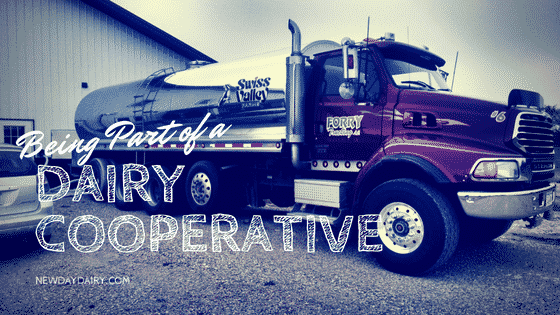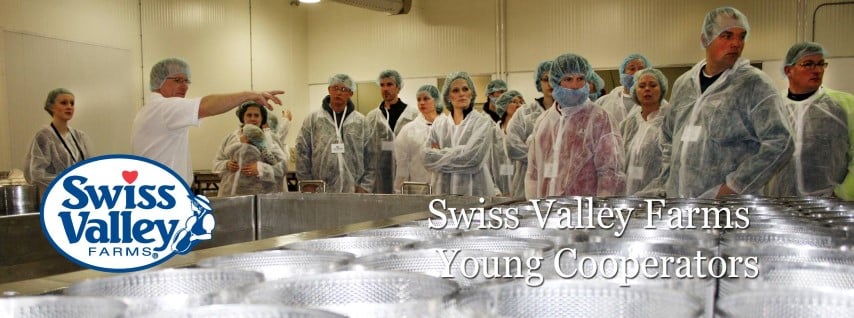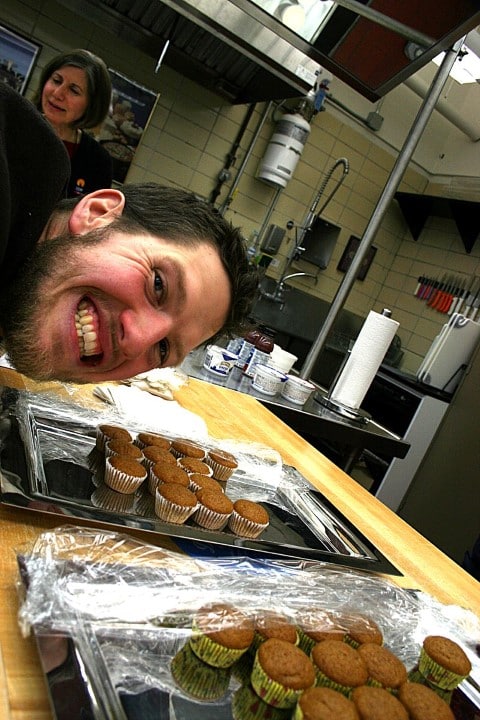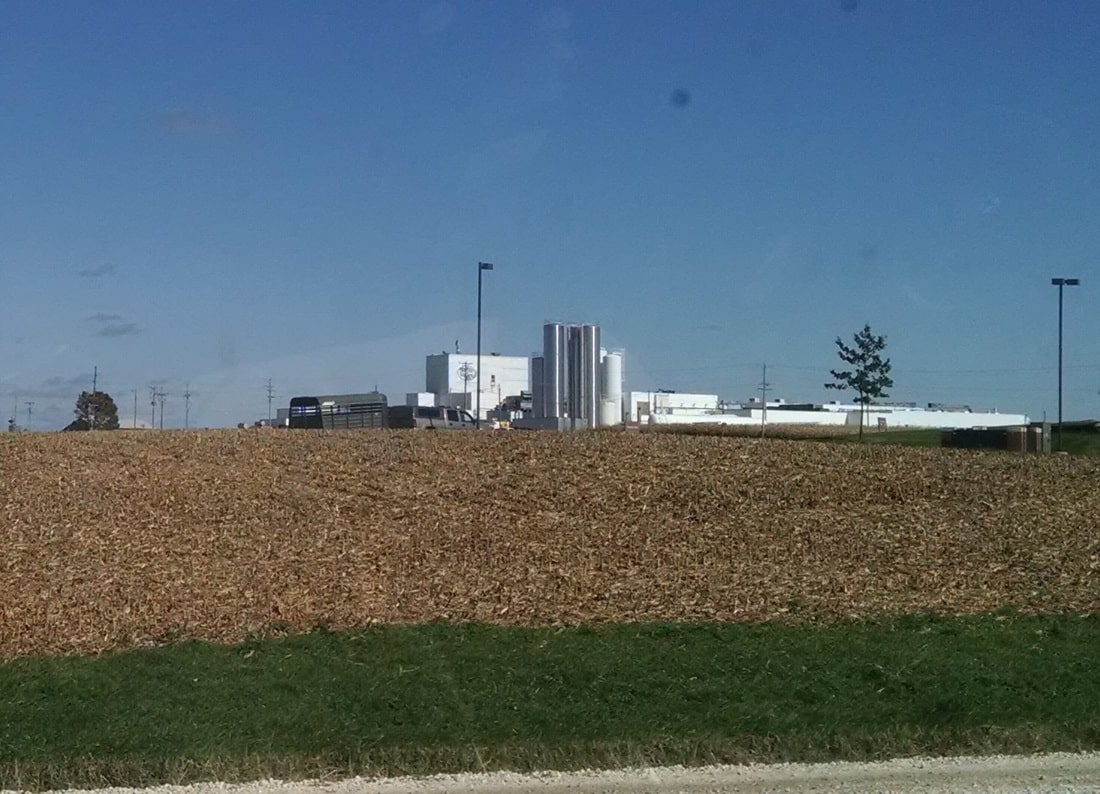So we’ve joined with other farmers to pool our milk together and then hire other people to take it from there! Because once our milk leaves the farm someone else has to take over in their specialty area from processing the milk into the many yummy dairy foods to marketing & selling those products both locally & globally!
What happens to our milk once we’ve milked the cows is one of the top questions we get asked. The simple answer? As member-owners our milk goes to Swiss Valley Farms. But you might have a few more questions… so read on!
What would your other options be if you weren’t part of Swiss Valley Farms?
1) We could process it ourselves, which some people like Hansen’s do but that would mean that we’d need to have some additional expertise & the machines/supplies necessary to pasteurize, make cheese, yogurt, ice cream, etc. which would take time away from caring for our cows.
2) We could also sell it on the open market to whichever milk plant, like Blue Bunny, needs or wants milk and then figure out how to get it there, again taking time away from caring for our cows, which is our specialty.
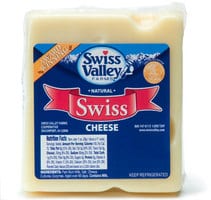
Yup! Here’s at least three great reasons!
1. Farm to Table… and Beyond! We get tell you where our milk usually goes and what it gets made into and I think that’s great because if you really want you can follow your food from Farm to Table, which is quite popular these days. Typically after our milk hauler picks up our milk along with other farms in the area, it gets taken to a cheese plant in Luana, Iowa. There’s a wide variety of cheese that it can become from there, our favorite is the Swiss, because you can try it yourself by purchasing some here!
But not all of our milk ends up on tables in the USA, some of it gets made into cream cheese that ends up in cheesecakes halfway around the world in Asia! And that’s pretty amazing to me, since on our own we’d never be able to make our milk into Swiss cheese for your table or into cream cheese and then figure out how to get it to Asia! Swiss Valley was even recognized this year as the 2016 Dairy Exporter of the Year by the US Dairy Export Council! Watch a video about it here!
|
Swiss Valley has other cheese plants too, all of which make a variety of cheese. You can purchase some for yourself from the Caves of Fairbault, or Cheese Caves, in Fairbault, MN (and get a peek inside the caves & be amazed by watching this short clip!). Or if grabbing a bite at Culver’s is more your style make sure to have a Grilled Rueben Melt or a Mushroom Swiss Butterburger, both included Swiss Cheese made at a Swiss Valley Farms plant in Wisconsin.
|
|
And there’s even a plant in Rochester, MN that makes processed cheese that ends up being used in all sorts of things like Goldfish or Cheez-its… yup there’s real cheese in those crackers!
2. Learning & Training Being part of a dairy cooperative also gives us on-going learning & networking opportunities in and out of Swiss Valley Farms. As young farmers we have the opportunity to get together with other “Young Cooperators” each spring for 2 days of learning from Dairy Extension Staff and consultants, discussing what’s happening within the cooperative, touring a farm or one our cheese plants, and having a little fun getaway from our 24/7 lives as dairy farmers!
But there’s even little things that have their advantages, like the monthly newsletter we get that highlights what’s happening in the various cheese plants, awards that our cheeses’ have won, and accomplishments & articles about other farmers, and more.
3. Market Protection Lastly and probably the biggest reason a lot of dairy farmers are part of dairy cooperatives is that part of being a member-owner ensures that Swiss Valley Farms will always give our milk a place to go to be processed and sent into the marketplace. When milk supply far exceeds demand for dairy products and the price we get paid for our milk is low the first milk that Swiss Valley Farms uses in it’s products is milk from it’s farmer owners, like us.
If we were selling our milk on the open market and trying to find the milk processor that would pay us the most for our milk, at times when the market is down, we’d get a lot less. We may miss out on the highest of high prices but we also are protected from the lowest prices or even not having anyone who wanted to buy our cow’s milk at all, which sadly can happen.
Along those same lines, being part owner’s of a company that makes our cows’ milk into cheese adds value to our cow’s milk because cheese has a much longer shelf life and is a much more unique product than milk on it’s own.
Isn’t that complicated? All that milk and all those plants?
Yes, it takes a lot of work and people to get the milk from our farm to the local grocery store shelf or half-way around the world for Asian cheesecakes! Milk is perishable so it has to stay cool & travel quickly & efficiently and we don’t want it making any unnecessary trips!
Swiss Valley Farms has a great team of folks who communicates between each of the cheese plants about how much milk they need and the many milk haulers who pick up milk from Swiss Valley farmers 365 days a year! Cows make milk everyday which means the cheese plants have to be making cheese everyday too! Weather, natural disasters, equipment malfunctioning, customer purchasing and a variety of other factors can come up and milk has to be redirected to fill needs or find a processing home. It can get complicated!
Milk is perishable and typically spends less than 24 hours in the HUGE stainless steel food grade milk silos at the processing plants. Milk travels incredible quickly & efficiently thanks to the hard work of the many logistic teams at all the different milk cooperatives & companies in the US.
So, How big is Swiss Valley Farms?
Swiss Valley Farms has farmer member owners in 4 upper-midwest states that all come together at their corners – Iowa, Illinois, Wisconsin, and Minnesota so although milk doesn’t actually travel very far from farm to processing plant it can cross state lines! Of the over 500 dairy farmers who are member-owners of Swiss Valley Farms, each of their farms is a little different – that’s the beauty of dairy farming! Some are smaller and some are bigger; some milk their cows in tie-stalls & others have robots milk their cows; some cows spend all summer on pasture while others stay in the shade of the barn with big fans (like our gals!) and a whole lot of other variables!
Yeah, but do the farmers actually have decision making power?
While I can’t vouch for every dairy cooperative at Swiss Valley Farms, yes they do or I should say they can, if they want to be involved. Every district elects a director who together make up the board of directors who meets at least monthly with the management team that they’ve hired to make decisions in the cooperative. And each district also has representatives that meet to discuss cooperative issues. My mother-in-law, Pam, served on the board for 26 years, the last 8 of which she was the Chairman of the Board. I can vouch that as Chair she typically had weekly conference calls with the CEO and vice-chair, talked with farmers in her district, and consulted with other district directors about the ins and outs of cooperative business. Is it easy to represent a diverse group of dairy farmers? Not always (is it ever really easy to cooperate?) but together we can do so much more than we could on our own and dairy cooperatives truly allow smaller farms to continue to survive as economies of scale push most every industry to grow & expand.
What about other dairy cooperatives? Are there more?
Yup! You may have heard of them. Dan’s aunt & uncle are part of AMPI (Associated Milk Producers Inc.), and I since grew up in the Twin Cities in Minnesota Kemps & Land O’ Lakes are the dairy cooperatives I grew up with. And don’t forget Cabot Cheese out in Vermont and lots of other dairy cooperatives throughout the country. The amazing thing about being an American dairy farmer is that I have options, a lot of options, about which other farmers I join to help make our cows’ milk into cheese, yogurt, ice cream, cottage cheese, chocolate milk, and more!
And Guess What???
And it just so happens that October is National Co-op Month. Did you know that in the United States there are more than 29,000 cooperatives that serve 350 million people? Maybe you’re even included in that number… what kind of cooperative are you part of? Electric, Dairy, Grocery, Credit Union, Health Care… there’s a lot of options!
Let me know in the comments!
UPDATE –

